Jerusalem artichoke syrup: calories, benefits and harms, recommendations for preparation and intake
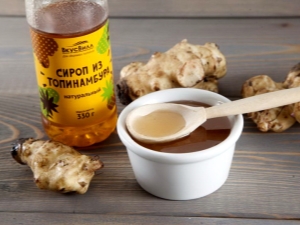
Jerusalem artichoke syrup is not so popular among our compatriots. And about what the fetus itself looks like, only a few know for sure. And very sorry. Since Jerusalem artichoke has many useful elements and minerals, it helps to cope with various ailments and is a universal remedy for the prevention of a large number of diseases. Jerusalem artichoke can be used to prepare various dishes and drinks, eat instead of apples or as a sugar substitute. This product will be appreciated by many - both diabetics and fans of proper nutrition, since, unlike sucrose, Jerusalem artichoke syrup saturates the body with the optimal amount of fructose and contributes to the saturation of the body. In this article we will talk about the beneficial properties, recommendations for use and methods for preparing a healthy medicinal syrup.
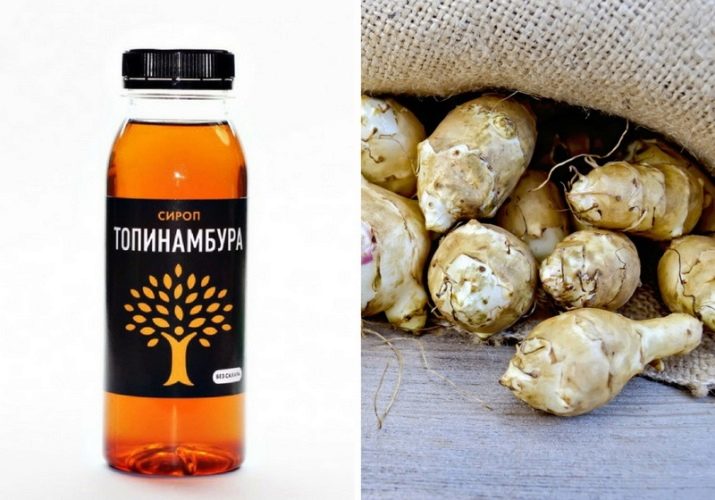
What is this plant?
Jerusalem artichoke is a perennial plant with yellow flowers that look like a colored chamomile or a small sunflower. But all the value is hidden underground. The sweet root crop has a large number of useful elements, and tastes a bit like a nut. Outwardly, the Jerusalem artichoke looks like a ginger or a pear of an unusual shape. But it has white and soft juicy pulp. And when preparing syrup, it retains the maximum amount of nutrients.And, importantly, the natural and pleasant sweetness is preserved. In its finished form, the syrup is used as a natural sweetener or sugar substitute.

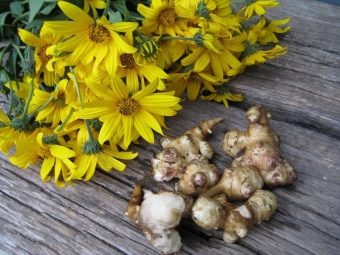
The birthplace of Jerusalem artichoke is South America, it is here that this sweet and healthy root crop is grown in large quantities. And on the territory of hot countries you can find Jerusalem artichoke growing in the natural wild. The Indians first discovered Jerusalem artichoke, who gave it the name "solar root" and added crushed root crops when cooking. And some time later, in the 17th century, Jerusalem artichoke appeared in France, and all thanks to travelers. Then Jerusalem artichoke quickly gained popularity in European countries and began to be actively grown as a vegetable and fodder crop. Then the new name "Jerusalem artichoke" appeared in honor of the Chilean Indian tribe.

Only a century later, a sweet root crop appeared in Russia, but even today it remains not so popular among our compatriots and is grown exclusively in the western part of the country. And at the moment, deliveries of Jerusalem artichoke from other countries have been established: China, Romania and Germany. In different countries, the root crop has its own name and is eaten in different ways. In China, it was called Chinese potato, and in Romania - Volosh turnip. And in the USA and Holland, the root crop is used to make coffee. In our country, for example, Jerusalem artichoke has another name - ground pear and is most often used in the preparation of syrup.
But also the root crop can be added when preparing some dishes:
- raw as an additional salad ingredient;
- during heat treatment for the preparation of soups or second courses;
- crushed Jerusalem artichoke can be used for baking and making desserts;
- for making kvass or fruit drink;
- for the preparation of syrup, which can be added to tea or eaten ready-made.
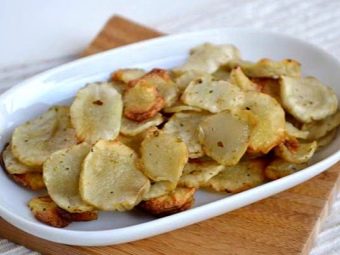
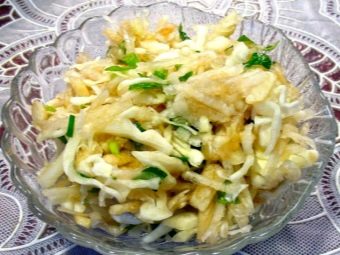
You can grow Jerusalem artichoke yourself in your summer cottage. In summer, the vegetable can be used to decorate the site - the plant has a long stem, on which flowers appear in August. Jerusalem artichoke is unpretentious in care and can even winter in the ground in a temperate climate down to -30 C. Therefore, it is recommended to dig up part of the crop in late autumn, and leave the second part of the root crop in the ground until spring. This is also due to the fact that the raw Jerusalem artichoke has a relatively short shelf life, so you will need to immediately take care of preparing the syrup. In addition, it is believed that in spring Jerusalem artichoke has a more pleasant and rich taste, and also has a large number of useful elements.
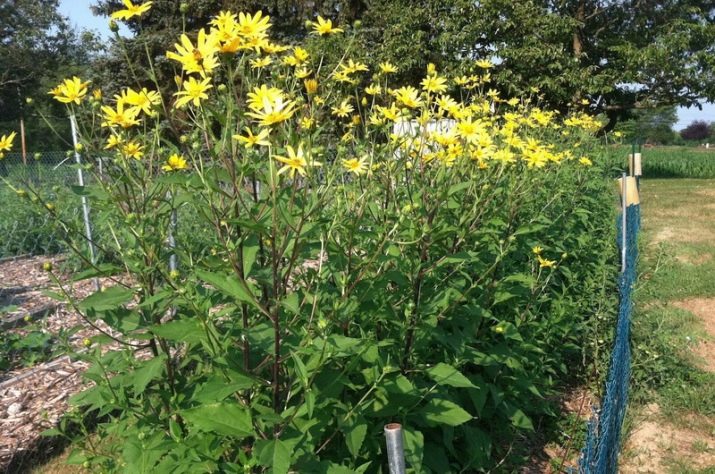
The uniqueness of Jerusalem artichoke lies in the high content of fructans. These are rare polymers that are found in small amounts in other products. A record concentration is found in Jerusalem artichoke tubers. This allows you to completely replace sugar and use only natural natural sweeteners. At the same time, constant consumption of syrup promotes the growth of friendly bacteria in the intestines and helps cleanse the body of toxins and waste. It also improves immunity and protects against a number of diseases.
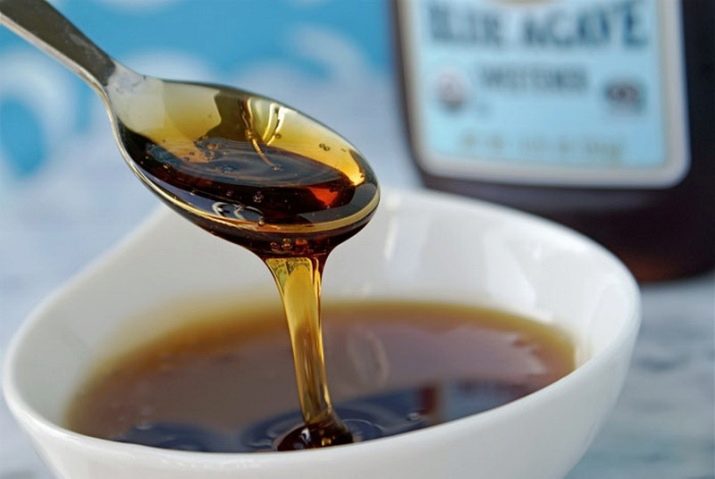
Composition and glycemic index
Jerusalem artichoke has a balanced chemical composition. And despite the sweet taste, the glycemic index of Jerusalem artichoke syrup is 13-15 GL.It is a natural sweetener that does not dramatically increase blood sugar levels, which is important for diabetics. The syrup contains more dietary fiber - about 40%. The advantage of dietary fiber is that they saturate the body and keep the feeling of satiety for a long time.
But Jerusalem artichoke also contains a record amount of useful elements and biologically active substances.
- Cellulose. It reduces the risk of gastritis, pancreatitis and malignant tumors.
- Inulin polysaccharide complex. Its content can reach 20%.
- Lemon acid. It is an unsurpassed element for maintaining the hormonal system. And also citric acid contributes to the accelerated processing of carbohydrates into energy.
- Apple acid. Saturates the cells and helps to maintain the acid-base balance in the body. Helps the immune system fight infectious and viral diseases.
- Succinic acid. Needed to maintain energy and strength.
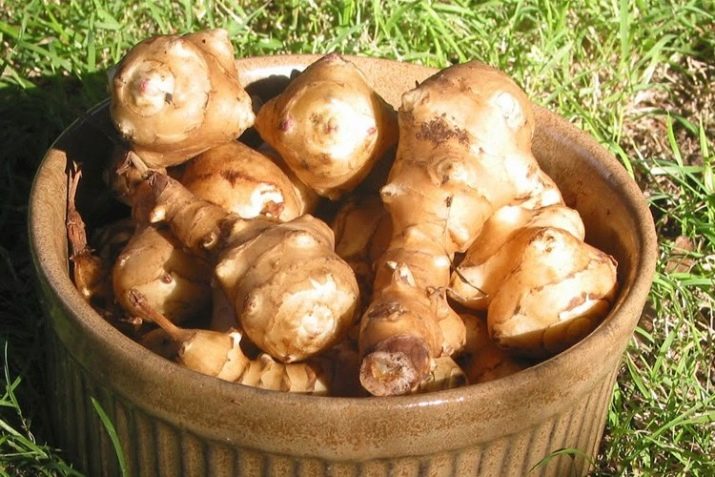
- Fumaric acid. Accelerates the recovery of the skin after various diseases and cuts.
- propanedioic acid. Helps fight high stress.
- Minerals and trace elements. Useful for our body iron, magnesium, calcium, potassium, manganese, phosphorus and zinc.
- Amino acids. They ensure the normal functioning of the body and the coordinated work of all organs.
- Vitamins of groups B, A, E, C and PP. They have a multifaceted effect on the body and strengthen the central nervous system.
- Pectins. They help to remove toxins and harmful substances from the body, but at the same time preserve the intestinal microflora.
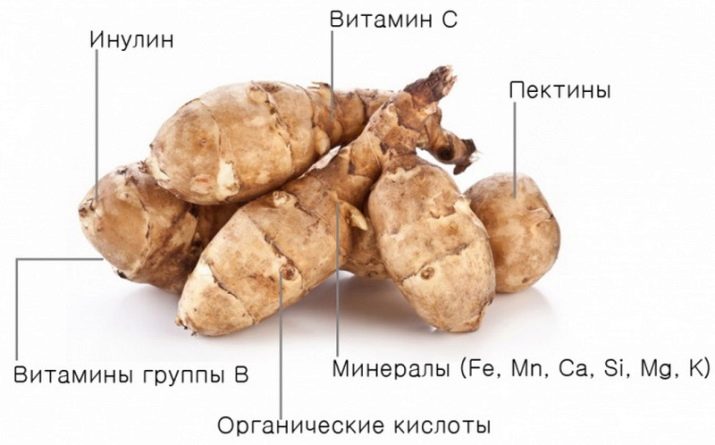
Such a unique composition and the absence of heavy metals make it possible to eat Jerusalem artichoke syrup not only for adults, but also for children.
How many calories are there?
Jerusalem artichoke can also be considered as an additional component of dietary nutrition. This item is undoubtedly important for fans of a healthy lifestyle and proper nutrition. The nutritional value of the raw Jerusalem artichoke root per 100 g is as follows.
Fats | 0.01 g |
Squirrels | 2.0 g |
Carbohydrates | 17.44 g |
calories | 73 kcal |
The nutritional value and calorie content of the finished sweet syrup is 267 kcal per 100 grams. Despite the sweet taste, the syrup contains slow carbohydrates, which are gradually converted into energy, and not deposited in fatty tissues. Therefore, you can use Jerusalem artichoke syrup not only in the morning.
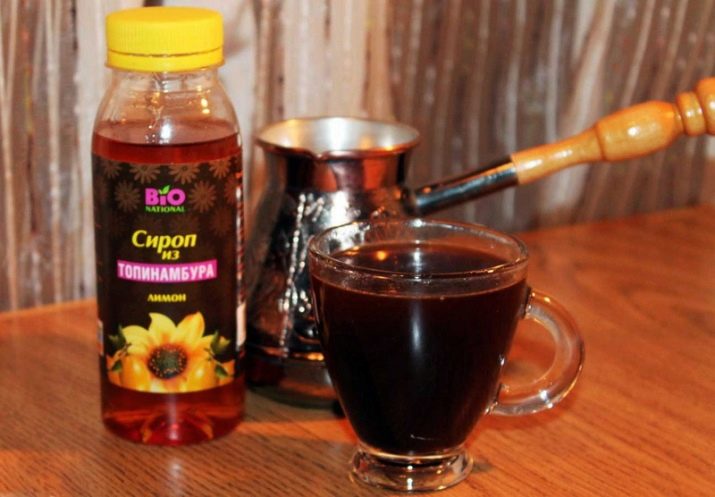
Beneficial features
The benefits of Jerusalem artichoke are confirmed by studies conducted by scientists from different countries. And a record number of useful elements and minerals is present in this root crop.
The ability to deal with numerous ailments and diseases has been proven by doctors.
- Jerusalem artichoke syrup is recommended for patients with diabetes, as it is a natural and biologically active sugar substitute. When taken regularly, it is possible to maintain blood sugar levels at the desired level without the use of insulin for diabetics. This is confirmed by numerous clinical trials of the Academy of Medical Sciences of the Russian Federation.
- It is also an excellent tool for strengthening the immune system - the constant consumption of Jerusalem artichoke in its raw form or as a syrup helps to increase the body's resistance to various infectious and viral diseases.Therefore, it is recommended to use for prevention during exacerbations of acute respiratory infections and acute respiratory viral infections, 2-3 tablespoons of syrup daily.
- The syrup allows you to increase brain activity and increase concentration during intellectual stress, therefore it is recommended to be taken during a busy period, for example, during a session with students, during a reporting period at work or in stressful situations.
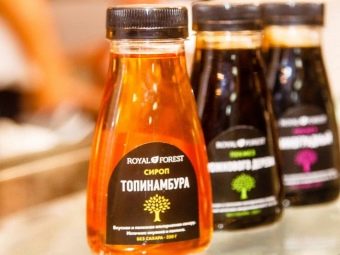

- Jerusalem artichoke syrup increases strength and endurance during physical exercise, therefore it is recommended for use by athletes during training, during the period of active and intensive preparation for competitions.
- It is a natural energy booster - this is a great way to get rid of chronic fatigue, drowsiness or fatigue.
- During pregnancy, the syrup helps to reduce discomfort during toxicosis and has a positive effect on the healthy development of the child.
- Syrup is especially useful for children during the period of active growth. A large amount of calcium and trace elements contributes to the proper formation and strengthening of the bone tissue of a growing organism.


- Regular consumption of syrup helps to get rid of headaches - in order to prevent migraines, you need to consume 2 tbsp daily. spoons of syrup.
- Jerusalem artichoke is an excellent tool for the prevention of cancer and helps to slow down the growth of tumor cells.
- A useful supplement to reduce pain in rheumatism, osteoporosis and joint treatment.
- Reduces puffiness - contributes to the normalization of water balance in the body.
- The use of syrup as a dietary supplement helps to restore metabolism, get rid of obesity and maintain a figure.
- Helps to get rid of digestive failures of the body. Regulates the work and normalizes the digestive system of the body.
- Normalizes bowel function and helps to cope with dysbacteriosis.


- It is considered an excellent remedy for getting rid of heartburn. Reduces the acidity of the stomach and relieves discomfort even after eating heavy meals.
- Accelerates the restoration of the functions of the gastrointestinal tract. Dietary fiber, which is contained in the Jerusalem artichoke root in large quantities, helps counteract gastrointestinal carcinoma.
- It helps to naturally cleanse the liver of poisons and protect the kidneys, but you should be careful when removing the gallbladder, so you should consult a therapist before using it.
- Helps the heart muscle. Biologically active components help to stabilize blood pressure, cleanse the walls of blood vessels and reduce the likelihood of arrhythmias.
- It is one of the best means in the prevention of vein thrombosis. Blood vessels dilate, blood clots are removed, and the walls are gradually cleared.


The list of useful properties can be long. Also, Jerusalem artichoke syrup is recommended to be used not only as a treatment, but also for the prevention of certain diseases, such as obesity, diabetes and metabolic disorders. To date, there are many natural and harmless sugar substitutes: honey, sugar cane syrup or corn syrup. But unlike them, Jerusalem artichoke syrup has more useful properties and when consumed, the sugar level does not rise sharply.
For men, Jerusalem artichoke is a natural substitute for Viagra. It also protects against cancer and prevents the development of prostate adenoma. For women, Jerusalem artichoke syrup is useful not only for weight loss. Regular consumption of food helps reduce the likelihood of breast tumors and is an excellent source of calcium, which is especially necessary during pregnancy. There are many recipes with positive feedback on the use of a healthy root vegetable as the basis of cosmetic and anti-aging procedures to preserve youth and beauty of the skin.

Harm
Despite the large number of useful elements and substances, one should not think that Jerusalem artichoke syrup is a panacea.
Daily eating has some contraindications.
- Individual intolerance of the body. Like any new product, Jerusalem artichoke should be introduced into the daily diet gradually and with caution, paying special attention to possible reactions of the body.
- Cholelithiasis. It is worth consulting with your doctor, as daily consumption of a sweet medicinal syrup can provoke the movement of stones and cause a clogged ureter.
- Raw consumption without heat treatment can cause flatulence.
- During pregnancy and while breastfeeding, you should also consult your doctor.

In some cases, problems may arise due to improper root cultivation. Or because of the content in the syrup of additional components to which there is an individual intolerance. In a pharmacy, for example, today you can buy Jerusalem artichoke syrup with rose hips, cranberries, raspberries or cherries. In other cases, Jerusalem artichoke syrup cannot harm the body.
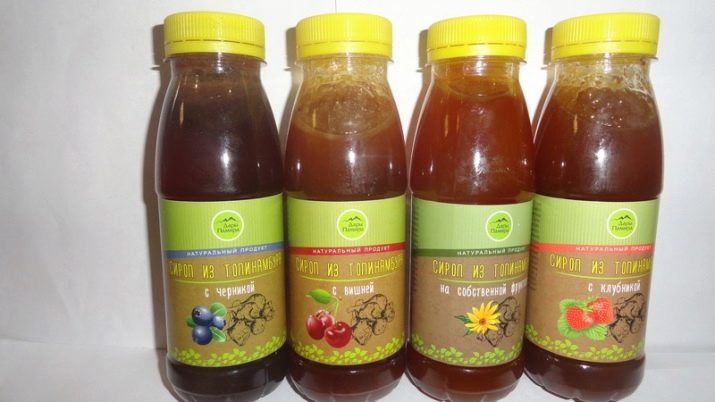
How to cook?
Ready-made syrup can be purchased at a pharmacy, as well as made independently at home. Quality syrup consists of three components: tuber fibers, water and lemon juice. The ingredients are taken in equal proportions. For cooking, it is recommended to use dishes made of glass, porcelain or stainless steel. It is better not to use plastic, wood, enamel or iron for this.
The recipe for Jerusalem artichoke syrup is simple.
- Before cooking, sweet tubers are thoroughly washed, dried and peeled. Although in some recipes it is recommended to leave the peel, because it contains a large amount of vitamins.
- After that, Jerusalem artichoke is crushed on a fine grater. To facilitate the process, you can use a blender or food processor. During grinding, a large amount of juice will stand out, which must be poured into a prepared container.
- The released juice must be put on a slow fire and heated over low heat for 10 minutes. Then cool at room temperature and heat again. This procedure must be repeated 5 times.
- Then lemon juice is added, water, the resulting mixture is thoroughly mixed. In a small saucepan, heat again over low heat for 10 minutes on the stove.
- After that, you need to leave the container with the syrup to brew for a couple of hours. And then strain through cheesecloth, pour into sterilized containers and put in the refrigerator for two days.
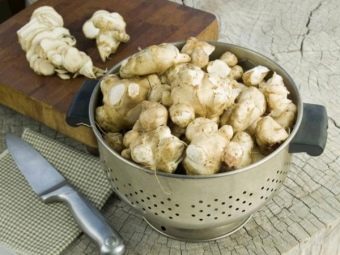
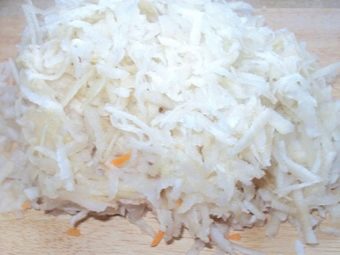
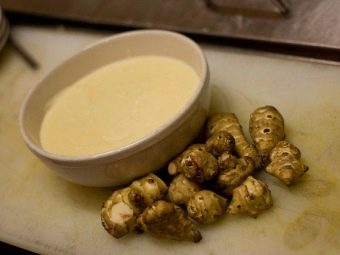
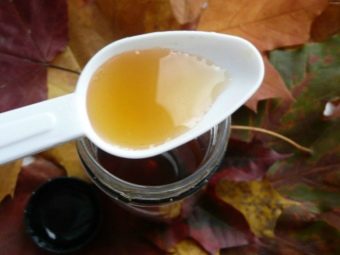
The finished syrup has a beautiful amber hue and has a pleasant sweet taste with a slight sourness. Store in a closed container in the refrigerator.
Application
Jerusalem artichoke syrup can be given to children at an early age during the complementary feeding period.The high content of calcium contributes to the formation and strengthening of bone tissue, and proteins are a solid foundation for the overall development of the baby. The recommended daily dose for children is half a teaspoon of syrup per day. Gradually, the dosage can be increased to 1-2 teaspoons per day. Ready-made natural syrup for children can be added to dairy products: yogurt, sour cream, cottage cheese.
Jerusalem artichoke syrup can be used in the treatment of diseases as a drug or for the purpose of prevention. The daily recommended dose also depends on this.
For prevention, it is recommended to take syrup:
- children under 6 years old - 0.5-2 teaspoons per day;
- children from 6 to 12 years old - 0.5-2 tablespoons per day;
- adults - 3-4 tablespoons per day.
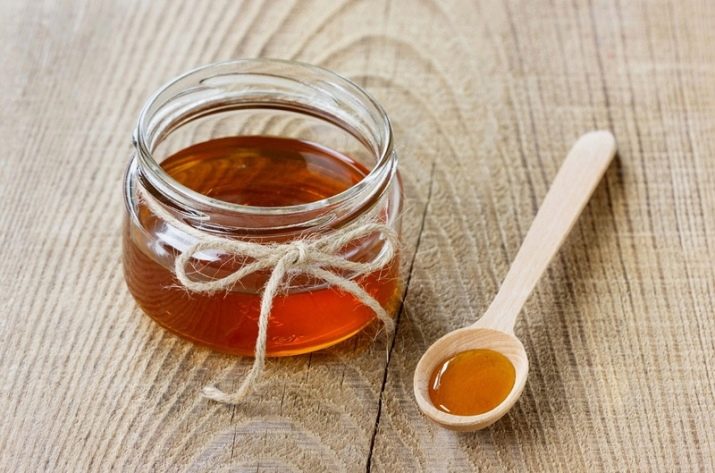
For oncological diseases and recovery of the body after radiation and chemotherapy, the recommended daily dosage of the syrup is 4-7 tablespoons per day. But before use, you should consult with your doctor. In the treatment of diabetes, the recommended dosage is 4-5 tablespoons per day. Before use, you should consult with a specialist, since it is possible to reduce the dose to 3-4 tablespoons. When following a diet for a sweet tooth, it is recommended to take the syrup twice a day in the morning, one tablespoon an hour before meals, and in the evening 2 tablespoons half an hour after dinner. In this case, the metabolism quickly normalizes, and the need for sugar consumption will decrease.
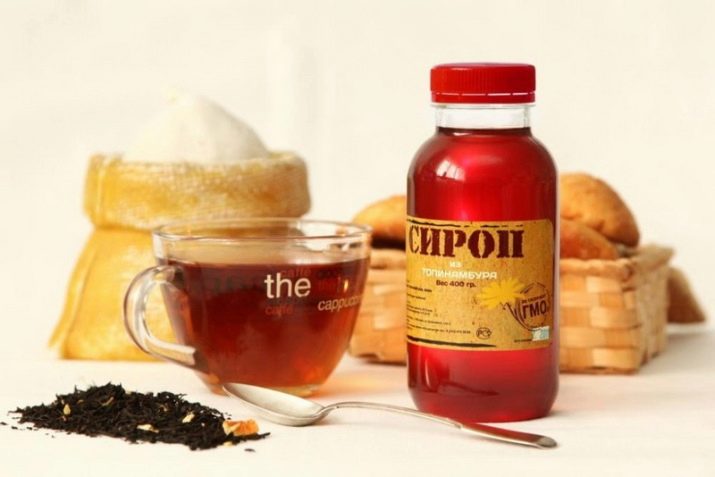
For the benefits of using Jerusalem artichoke syrup, see the following video.

















